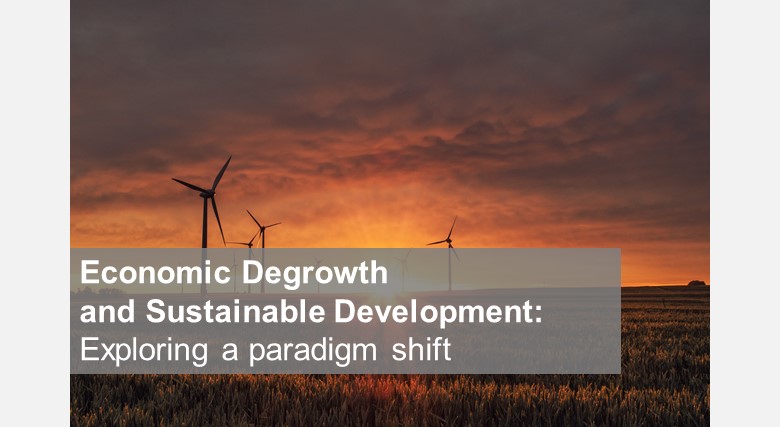“Anyone who believes that exponential growth can go on forever in a finite world is either a madman or an economist”. This statement given by Kenneth Boulding, the renowned economist back in 1970s, is relevant more than ever. After decades of economic growth that was based on the depletion of natural resources, stretching the limits of our planet, it has become obvious that such growth is not sustainable and does not go hand in hand with quality of life for all, nor sustainable development. And although economic growth has brought many benefits, this pattern of one-sided development based on the Industrial Revolution model has now become obsolete. That is why the concept of economic degrowth has emerged lately and it does not imply stagnation, but on the contrary, a more rational and balanced growth with respect to natural resources and social inclusion.
Why consider degrowth?
In September 2018, the Post-Growth 2018 Conference took place in Brussels, organized by ten Members of the European Parliament representing five political groups in order “to re-think future policies and discuss alternatives respecting the environment, human rights and viable economic development”. The aim of the conference was to challenge the EU institutions’ policies, criticizing the continuous pursuit of growth and taking GDP as the primary measure of development. The reasons given to support the concept of degrowth are following:
- “circular economy can only work to a limited extent”,
- “improving energy efficiency has not decreased our energy consumption – in many cases the opposite”,
- “because ‘decoupling’ economic growth from carbon emission growth is not enough to slow down global warming”,
- “inequality has been on the rise for decades, which worries even the rich 1%”,
- “our growth relies on debt and financial markets, prone to bubbles and collapses – but the system could be designed differently”.
How to handle degrowth?
Sustainable development requires “social inclusion and rational use of natural resources” but the current economic model, that emphasizes growth at any cost, is at odds with main characteristics of such development. The key question is how sustainable development can be attained but without the sacrifices of the current economic growth model we have witnessed so far. The proposal came from a group of more than 200 academics who published their suggestions in a letter directed to the European Union, asking EU and its member states to:
- “Constitute a special commission on post-growth futures in the EU parliament. This commission should actively debate the future of growth, devise policy alternatives for post-growth futures, and reconsider the pursuit of growth as an overarching policy goal”,
- “Incorporate alternative indicators into the macroeconomic framework of the EU and its member states. Economic policies should be evaluated in terms of their impact on human wellbeing, resource use, inequality, and the provision of decent work. These indicators should be given higher priority than GDP in decision-making”,
- “Turn the Stability and Growth Pact (SGP) into a stability and wellbeing pact. The SGP is a set of rules aimed at limiting government deficits and national debt. It should be revised to ensure member states meet the basic needs of their citizens, while reducing resource use and waste emissions to a sustainable level”,
- “Establish a ministry for economic transition in each member state. A new economy that focuses directly on human and ecological wellbeing could offer a much better future than one that is structurally dependent on economic growth”.
Is degrowth feasible?
Well, there is no an easy answer. During the last decades, there has been an economic growth, but it has depleted the limited natural resources and its benefits have not been allocated fairly. Yet, how humanity can move forward and develop sustainably implementing degrowth strategy will be answered by policy makers but it seems that Kenneth Boulding knew the answer: “The troubles of the 20th century are not unlike those of adolescence — rapid growth beyond the ability of organizations to manage, uncontrollable emotion, and a desperate search for identity. Out of adolescence, however, comes maturity in which physical growth with all its attendant difficulties comes to an end, but in which growth continues in knowledge, in spirit, in community, and in love; it is to this that we look forward as a human race. This goal, once seen with our eyes, will draw our faltering feet toward it.”
References:
- Guercio, M. (2015). Sustainability and economic de-growth. [ebook] Available at: https://sustainabledevelopment.un.org/content/documents/6534116_Guercio_Sustainability%20and%20economic%20degrowth.pdf
- Post-Growth 2018. (2019). Home – Post-Growth 2018. [online] Available at: https://www.postgrowth2018.eu/
- Cole, D. (1983). Conflict resolution technology. Cleveland: The Organisation Development Institute, p.5.
Photo by Karsten Würth (@inf1783) on Unsplash

